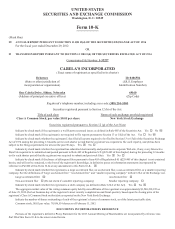Cabela's 2012 Annual Report Download - page 21
Download and view the complete annual report
Please find page 21 of the 2012 Cabela's annual report below. You can navigate through the pages in the report by either clicking on the pages listed below, or by using the keyword search tool below to find specific information within the annual report.11
as describing the condition or future prospects of a depository institution, including WFB. In addition, at the
end of 2012, the most recent notification from the FDIC categorized WFB as “well-capitalized” under the
regulatory framework for prompt corrective action. We may be required to invest additional capital in WFB for
WFB to remain “well-capitalized.” See “Risk Factors - We may have to reallocate capital from our Retail and
Direct businesses to meet the capital needs of our Financial Services segment, which could alter our retail store
expansion program.”
The consumer lending activities of WFB are subject to regulation under various federal and state laws.
We spend significant amounts of time ensuring we are in compliance with these laws and work with our service
providers to ensure that actions they take in connection with services they perform for us are also in compliance
with these laws. Depending on the underlying issue and applicable law, regulators are authorized to impose
penalties for violations of these statutes and, in some cases, to order WFB to compensate borrowers. In 2012, the
Bureau, acting in conjunction with the FDIC and other agencies, announced its first high-profile enforcement
actions against credit card issuers for deceptive marketing and other illegal practices related to the advertising
of ancillary products, collection practices and other matters. By these recent public enforcement actions, the
Bureau and the FDIC have signaled a heightened scrutiny of credit card issuers. We anticipate increased activity
by regulators in pursuing consumer protection claims going forward. Borrowers may also have a private right of
action to bring actions for some violations. Federal bankruptcy and state debtor relief and collection laws also
affect the ability of our bank subsidiary to collect outstanding balances owed by borrowers.
Several rules and regulations have recently been proposed or adopted by the Securities and Exchange
Commission (“SEC”) that may substantially affect issuers of asset-backed securities. It remains to be seen
whether and to what extent any final rules adopted by the SEC will impact our bank subsidiary and its ability and
willingness to continue to rely on the securitization market for funding. See “Risks Factors - We may experience
limited availability of financing or variation in funding costs for our Financial Services segment, which could limit
growth of the business and decrease our profitability,” “Risks Factors - The Dodd-Frank Wall Street Reform and
Consumer Protection Act may impact the practices of our Financial Services segment and could have a material
adverse effect on our results of operations” and “Management’s Discussion and Analysis of Financial Condition
and Results of Operations - Developments in Legislation and Regulation.”
Taxation Applicable to Us. We pay applicable corporate income, franchise, sales, and other taxes to states
in which our retail stores are physically located. As we open more retail stores, we will be subject to tax in an
increasing number of state and local taxing jurisdictions.
Other Regulations Applicable to Us. We must comply with federal, state, and local regulations, including
the federal Brady Handgun Violence Prevention Act, which require us, as a federal firearms licensee, to perform a
pre-sale background check of purchasers of hunting rifles and other firearms.
We also are subject to a variety of state laws and regulations relating to, among other things, advertising,
pricing, product safety, and product restrictions. Some of these laws prohibit or limit the sale, in certain states
and locations, of certain items we offer, such as firearms, black powder firearms, ammunition, bows, knives, and
similar products. State and local government regulation of hunting can also affect our business.
We are subject to certain federal, state, and local laws and regulations relating to the protection of the
environment and human health and safety. We believe that we are in substantial compliance with the terms of
environmental laws and that we have no liabilities under such laws that we expect to have a material adverse effect
on our business, results of operations, or financial condition.
Our Direct business is subject to the Mail or Telephone Order Merchandise Rule and related regulations
promulgated by the Federal Trade Commission (“FTC”) which affect our catalog mail order operations. FTC
regulations, in general, govern the solicitation of orders, the information provided to prospective customers, and the
timeliness of shipments and refunds. In addition, the FTC has established guidelines for advertising and labeling
many of the products we sell.
























